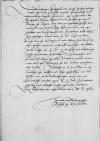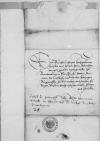Dem durchlauchtigen, hochgebornen fursten und herren, hern ⌊Albrechten⌋, von Gots gnaden marggraffen zu ⌊Brandenburg⌋, / in ⌊Preussen⌋, / zu ⌊Stettin⌋, ⌊Pommern⌋, / der ⌊Cassuben⌋ und ⌊Wenden⌋ hertzogen, burggraffen zu ⌊Nurmberg⌋ und fursten zu ⌊Rugen⌋, / unserm hochgunstigen, lieben herren und freunde /
Durchlauchtiger, hochgeborner furst, hochgunstiger, lieber her und freundt. / Unsere freuntliche und vleiswillige dienste zuvoran. /
Es hat uns der hochgelert ⌊doctor Hyeronimus⌋, stadtartzt unnd burger zu ⌊Thorn⌋, / dem wir mit gefatterschafft / vorwanndt, / vor seinen sohn ⌊Hieronimum⌋, / ein geschickten und nicht ungelarten jungling, / uffs vleissigt gebethen, / weil Euer Furstliche Durchlaucht sonst anndere junge leut zu ⌊Leiptzig⌋ in iren kosten zur lernung thut halten / und mit notturfft vorsorgen, / denselbten seinen sohn Euer Furstliche Durchlaucht in die zahl / und bekostunge solcher studenten zubevelhen, / derwegen wir freuntlich bitten, gemelten jungling wolde annemen / und gen Leiptzig zu den andern vorschreiben lassen, / welchs er, so im Gott in gesundtheit zu volkomner lehre geholffen, ane ablassen mit seinen underthenigen / und wir mit freuntlichen diensten umb Euer Furstliche Durchlaucht zuvordienen / schuldig und willigk wollen gefunden werdenn. /
Datum ⌊Heylsberg⌋, den XXV
Novembris M D XLIII. /
⌊Ioannes⌋, von Gottes gnaden bischoff zu ⌊Ermlandt⌋ /

